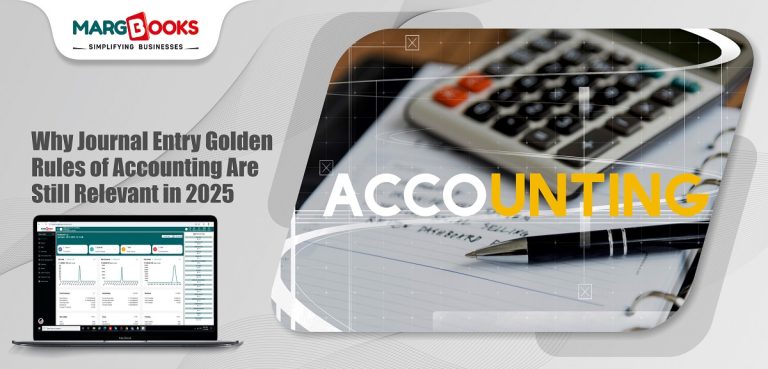In the fast-paced world of modern finance and technology, one might wonder if the age-old journal entry golden rules of accounting still hold any relevance. With online accounting software automating complex tasks, artificial intelligence stepping into financial reporting, and businesses moving towards digitisation, the fundamentals of traditional accounting may seem like a thing of the past.
However, even in 2025, the journal entry golden rules of accounting remain the foundation upon which all financial systems are built. These rules have stood the test of time and continue to be the guiding light for bookkeepers, accountants, and business owners across industries.
Let’s explore why these golden rules are still important and how tools like MargBooks are preserving their essence in the digital era.
What Are the Journal Entry Golden Rules of Accounting?
Before we dive into their relevance today, let’s quickly recap the three core golden rules of accounting. These rules are based on the type of account involved in a transaction—real, personal or nominal.
- Real Account
Rule: Debit what comes in, Credit what goes out
Example: If you purchase machinery for your business, debit the machinery account and credit cash or bank. - Personal Account
Rule: Debit the receiver, Credit the giver
Example: If you receive money from a customer, debit cash and credit the customer’s account. - Nominal Account
Rule: Debit all expenses and losses, Credit all incomes and gains
Example: When paying rent, debit the rent account and credit cash or bank.
Relevance in the Age of Automation and Online Tools
You might ask—aren’t these handled by software nowadays? Why learn these rules manually? Here’s the thing: even the most advanced online accounting software relies on these basic rules to function properly.
1. Foundation of Financial Understanding
Whether you’re using a manual ledger or an advanced tool like MargBooks, the journal entry golden rules of accounting help you understand how money flows in and out of your business. This clarity is essential not just for accountants but also for entrepreneurs and small business owners.
“A business owner who understands the golden rules can make smarter financial decisions.”
2. Behind Every Click Is a Journal Entry
Today’s accounting software simplifies the process, but the logic remains the same. When you enter a sale in MargBooks, the system automatically passes journal entries in the background. Knowing these rules allows you to verify entries and spot errors, which could be critical during audits or tax filing.
3. Accuracy in Financial Reporting
Wrong journal entries can distort your balance sheet or profit and loss statement. Even with software assistance, incorrect categorisation or misunderstanding of accounts can lead to misleading reports. Understanding the rules ensures better data input and higher accuracy.
4. Audit Readiness and Compliance
Auditors often backtrack transactions to their journal entries. Knowing the logic behind these entries makes you better prepared for financial scrutiny. Tools like MargBooks also maintain clear audit trails while sticking to the accounting principles, giving you the best of both worlds.
How MargBooks Integrates Traditional Accounting With Modern Technology
MargBooks is a cloud-based online accounting software tailored for Indian businesses. It doesn’t just automate bookkeeping; it ensures that every automation still respects the foundational golden rules.
Here’s how MargBooks bridges tradition and innovation:
- Auto-generated journal entries based on predefined rules
- Customisable account heads for better control
- User-friendly dashboards to track debits and credits visually
- In-built compliance with Indian GST and tax norms
- Training modules to help users understand accounting basics
So even if you’re not an expert in double-entry bookkeeping, MargBooks guides you every step of the way—keeping the golden rules alive while making your accounting smarter.
Who Still Needs to Learn These Rules in 2025?
Even though technology has changed the game, these rules are still being taught in B.Com classes, CA coaching centres, and business schools. Why? Because:
- They help students build strong accounting concepts
- Entrepreneurs can avoid costly financial mistakes
- Freelancers and self-employed professionals can manage their books better
- Finance managers can ensure accountability within their teams
Whether you’re using a spreadsheet, a diary, or online accounting software like MargBooks, these rules empower you with financial confidence.
Final Thoughts
The journal entry golden rules of accounting are not relics of the past. They are timeless principles that form the language of business. Even in 2025, as businesses scale globally and use powerful software, these rules are more than relevant—they are essential.
Technology may have evolved, but its backbone is still rooted in accounting logic. With platforms like MargBooks, Indian businesses can enjoy the speed and ease of digital accounting while staying true to the fundamentals.
So next time you record a transaction—remember, behind every debit and credit is a golden rule still shining bright.




